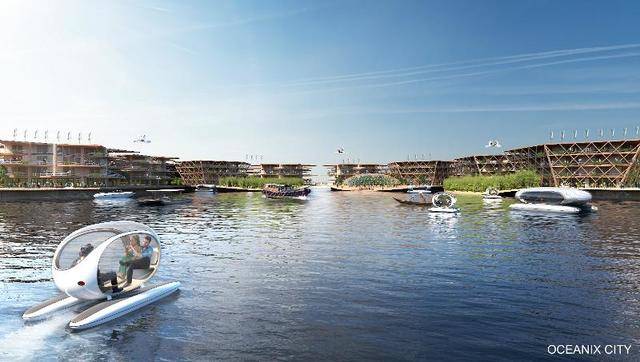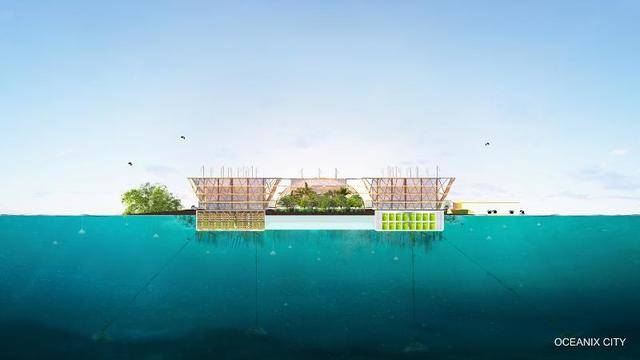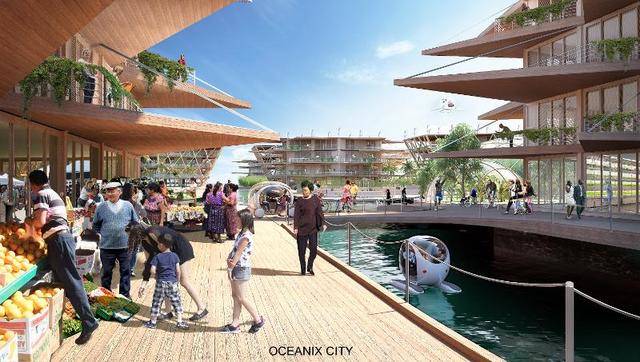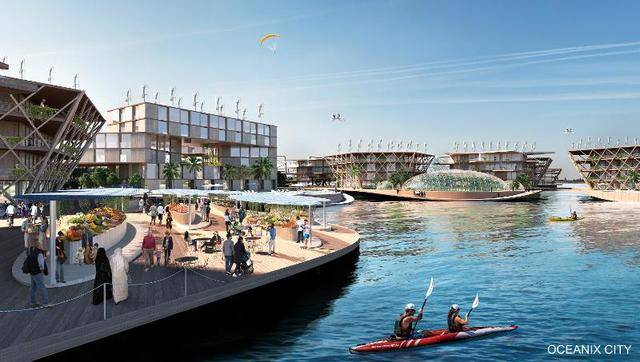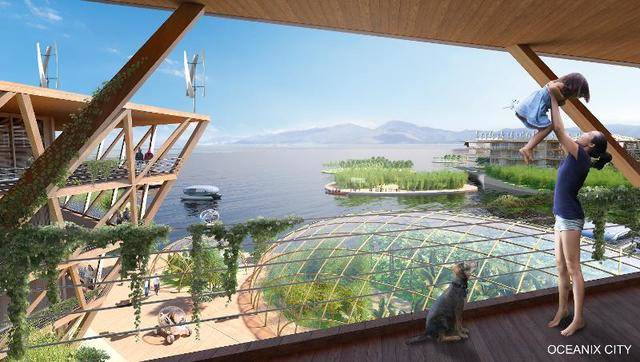Like it or not, the world is sinking. If the predictions play out, the rise in sea levels is going to make a big difference in communities around the world soon. Places like Wall Street, Miami, Shanghai, and Cape Cod could be completely underwater in less than a hundred years.
This month though, a bizarre but brilliant idea was introduced at the United Nations by an entrepreneur who hopes to save humanity by building floating cities that use smart technology, extreme recycling, and a futuristic plan to build floating islands that could be moored to the ocean floor.
Bless the late Dennis Hopper, but the architect Bjarke Ingels, who designed the project, said, “The idea that we are presenting here is not that we will all be living at sea in the future. It won’t be Waterworld.”

The idea is to build hexagonal floating islands about the size of three football fields to house something like 300 people and then link them to form self-sustaining communities. Hook a bunch of these floating islands together, with each having a communal purpose, and suddenly you have a village, which the creators say could eventually total some 10,000 residents.
“The idea that we are presenting here is not that we will all be living at sea in the future. It won’t be Waterworld.”
The concept comes from entrepreneur Mark Collins Chen, who was formerly the minister of tourism in his native French Polynesia, which is definitively on the list to sink in the next few decades. Last year, Chen formed a company called Oceanix to examine, theorize, and build off-shore urban infrastructures to help mankind weather the coming storm.
There are two big differences between Chen’s concept and plenty of other ideas for alternatives to land-based communities. The first is scalability: if Oceanix can make one island, the experiment could theoretically be re-created over and over again.
The second difference is that Chen’s concept includes a very clear plan to anchor these floating communities about a mile off the coast of major global cities. Specifically, Chen and Ingels want to use a material called biorock, which uses small bursts of electricity to stimulate the growth of limestone from ocean mineral deposits — a real-world concept that is not only ecologically friendly but is also currently used to foster the growth of coral reefs.
It’s admittedly a pretty Utopian vision, as you can see from the concept images. Ingels framed it like this in his comments: “Imagine a community port where you have a market down by the sea, where you can go in the evening and stroll and hang out, where you can move around on electrical nautical vehicles on this bazaar-like street along canals that connect and separate islands. The same configuration can be the canvas for any culture. What you’re designing is an urban social infrastructure.”

The other cool thing is that Chen and his team have pulled in a bunch of smart people to tackle the essential problems. This is basically Battlestar Galactica with the advantage of water. Food? Let’s grow it, using outdoor vertical farming combined with hydroponics and aeroponics and, of course, beans. Greywater recycling? check. Extreme water recycling including water desalination? check. Hydroponics, aeroponics, sustainable transportation, and a platform that can potentially withstand a nightmarishly violent hurricane? check. Pneumatic trash tubes to flush garbage to a sorting station to identify and repurpose stuff? check.
Big picture: it’s a pretty cool idea. When you zoom out, Oceanix envisions a central open port with each “island” featuring important areas to meet the need for healthcare, education, spirituality, exercise, culture, etc. If a place sinks, Chen’s idea gives people a place to go, whether it’s temporary or permanent.
“We’re not just theorizing. Everybody on the team actually wants to get this built.”
The idea was unveiled at the First UN High-level Roundtable on Sustainable Floating Cities, which while being kind of scary, was convened with Oceanix, MIT, the Explorers Club and UN-Habitat, a United Nations offshoot mandated to work on the problem of, you know, preventing cities from drowning and stuff.
Chen is bold in his predictions. “We’re not just theorizing. Everybody on the team actually wants to get this built.” To that end, the first step would be producing a prototype of this artificial island located on New York’s East River.
There’s been some concern that some of these enterprises are attempting to create refuges only for those who can afford it, but Chen says that’s not the goal of this initiative.
“It is our goal to make sure sustainable floating cities are affordable and available to all coastal areas in need,” Chen said. “They should not become a privilege of the rich.”
While the science-fictional concept was introduced at the United Nations, the organization hasn’t formally adopted or endorsed the proposal. However, Assistant Secretary-General and Deputy Executive Director of UN Habitat Victor Kisob said, “All solutions must be considered in how we build cities. It’s our duty to make sure this burgeoning sector is mobilized for the good of all people.”

